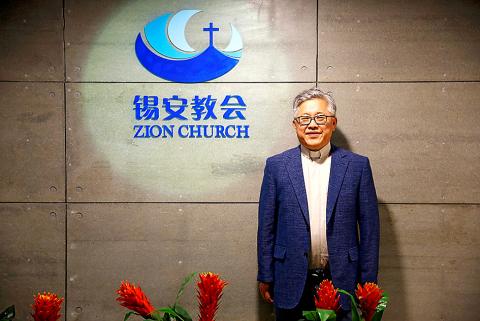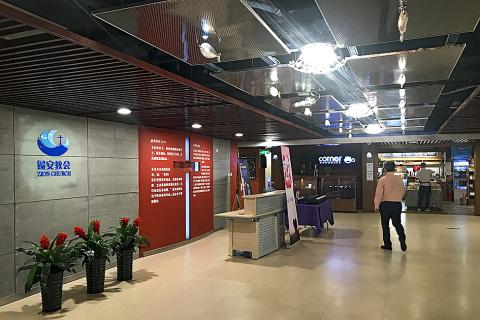Beijing officials have shut down one of China’s largest “underground” Protestant churches for operating without a license, the government’s latest move to ramp up control over religious worship.
About 70 officials stormed into the Zion Church — housed on the third floor of a nondescript office building in the north of the capital — after its afternoon service on Sunday, church Pastor Ezra Jin Mingri (金明日) said yesterday.
“They chased everyone out and sealed off the place, even tearing down our signage on the wall,” Jin said. “All our things have been confiscated and we have not been allowed to re-enter the building.”

Photo: Reuters
The local civil affairs bureau said the church and its affiliates have been banned.
“After investigation, [we found] the ‘Zion Church in Beijing’ was not registered and carried out activities in the name of social organizations without authorization,” the Chaoyang district civil affairs bureau said in a statement.
Jin was among about 200 pastors from underground churches who put their name to a petition complaining of “assault and obstruction” by the government — including the tearing down of crosses — since new religious regulations came into effect in February.

Photo: AP
Zion was one of the largest “house” churches in Beijing, with up to 1,500 people attending its weekly services.
At least a dozen marked police vehicles and scores of officers in uniform and plainclothes yesterday were guarding the building where the congregation held its services.
Journalists were barred from entering the building. The officers said the third floor was sealed off.
News of Zion’s closure came after Bob Fu (傅希秋) of the US-based China Aid group said over the weekend that the closure of churches in Henan Province and actions taken against Zion in recent weeks represented a “significant escalation” of the government’s crackdown on Christian congregations.
The campaign corresponds with a drive to “Sinicize” religion by demanding loyalty to the Chinese Communist Party and eliminating any challenge to its power over people’s lives.
“The international community should be alarmed and outraged for this blatant violation of freedom of religion and belief,” Fu wrote in an e-mail to reporters.
Fu also provided video footage of what appeared to be piles of burning Bibles and forms stating that the signatories had renounced their Christian faith.
He said that marked the first time since Mao Zedong’s (毛澤東) 1966 to 1976 Cultural Revolution that Christians had been compelled to make such declarations, under pain of expulsion from school and the loss of welfare benefits.
A Christian pastor in Nanyang, Henan Province, said crosses, Bibles and furniture were burned during a raid on his church on Wednesday.
The pastor, who asked not to be identified by name to avoid repercussions from authorities, said several people entered the church just as it opened its doors at 5am and began removing items.
He said the church had been in discussions with local authorities who demanded it “reform” itself, but no agreement had been reached or official documents released.
A local official reached by telephone at the Nanyang City Government disputed the account, saying officials respected religious freedom.
The man declined to give his name, as is common with Chinese bureaucrats, while a person answering phones at the local religious affairs bureau said they were “not clear” about the matter.

REVENGE: Trump said he had the support of the Syrian government for the strikes, which took place in response to an Islamic State attack on US soldiers last week The US launched large-scale airstrikes on more than 70 targets across Syria, the Pentagon said on Friday, fulfilling US President Donald Trump’s vow to strike back after the killing of two US soldiers. “This is not the beginning of a war — it is a declaration of vengeance,” US Secretary of Defense Pete Hegseth wrote on social media. “Today, we hunted and we killed our enemies. Lots of them. And we will continue.” The US Central Command said that fighter jets, attack helicopters and artillery targeted ISIS infrastructure and weapon sites. “All terrorists who are evil enough to attack Americans are hereby warned

The death of a former head of China’s one-child policy has been met not by tributes, but by castigation of the abandoned policy on social media this week. State media praised Peng Peiyun (彭珮雲), former head of China’s National Family Planning Commission from 1988 to 1998, as “an outstanding leader” in her work related to women and children. The reaction on Chinese social media to Peng’s death in Beijing on Sunday, just shy of her 96th birthday, was less positive. “Those children who were lost, naked, are waiting for you over there” in the afterlife, one person posted on China’s Sina Weibo platform. China’s

‘POLITICAL LOYALTY’: The move breaks with decades of precedent among US administrations, which have tended to leave career ambassadors in their posts US President Donald Trump’s administration has ordered dozens of US ambassadors to step down, people familiar with the matter said, a precedent-breaking recall that would leave embassies abroad without US Senate-confirmed leadership. The envoys, career diplomats who were almost all named to their jobs under former US president Joe Biden, were told over the phone in the past few days they needed to depart in the next few weeks, the people said. They would not be fired, but finding new roles would be a challenge given that many are far along in their careers and opportunities for senior diplomats can

Seven wild Asiatic elephants were killed and a calf was injured when a high-speed passenger train collided with a herd crossing the tracks in India’s northeastern state of Assam early yesterday, local authorities said. The train driver spotted the herd of about 100 elephants and used the emergency brakes, but the train still hit some of the animals, Indian Railways spokesman Kapinjal Kishore Sharma told reporters. Five train coaches and the engine derailed following the impact, but there were no human casualties, Sharma said. Veterinarians carried out autopsies on the dead elephants, which were to be buried later in the day. The accident site